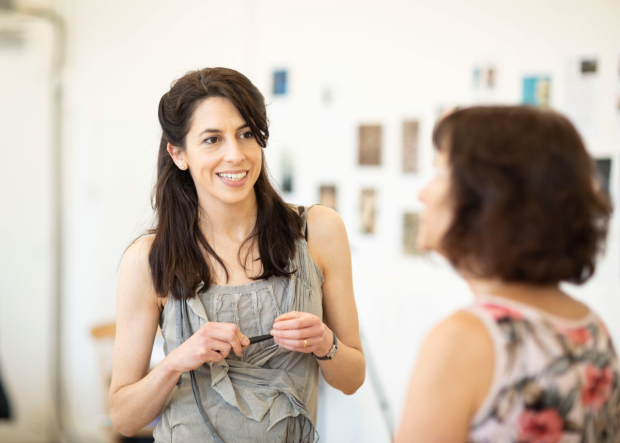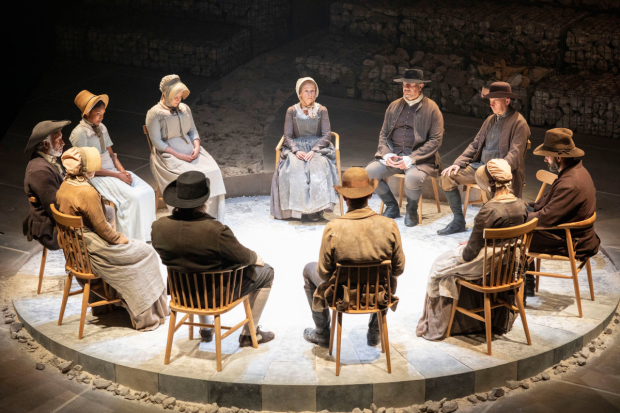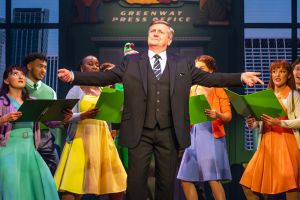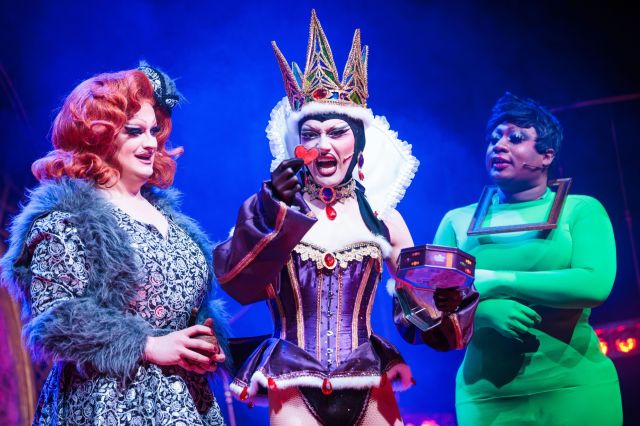Natalie Abrahami: Theatre must focus on climate change
The director’s production of Charlotte Jones’ ”The Meeting” is currently running at Chichester Festival Theatre

© Helen Maybanks
Having started as a graduate trainee at the Royal Court, director Natalie Abrahami ran west London's Gate Theatre from 2007 to 2012 with Carrie Cracknell. Her productions there included Women in Love by Mark Ravenhill and Vanya, an adaptation of Uncle Vanya by Sam Holcroft. Since she was there, she has been associate director at the Young Vic and Hull Truck and an associate artist at Nuffield Theatre. This year, her freelance career has seen her stage a production of Sophie Treadwell's remarkable and under-performed play Machinal as well as direct Charlotte Jones' new play, about a community of Quakers in 1805, at Chichester Festival Theatre. Here she explains why she's not ready to go back to running a building and what grabbed her when she first read The Meeting.
What made you want to direct The Meeting?
I printed it out on my shoddy printer at home and in the last 20 pages I was just crying and crying and the ink was running. I was drawn into the characters and was invested in each and every one of them. It was a guttural reaction to the sucker punch of the play. It was the second and third reading that made me realise how deftly woven it is. It's been distilled over ten years, and is a call to arms about how we can be a better society and how each of us can be better in and of ourselves. It's beautiful and empowering.
So has Charlotte been working on it for ten years?
She attended a Quaker meeting in Lewes in Sussex for about five years and was really struck by the testimonies. They are an incredibly interesting faith, their principle testimonies are to peace and everything stems from that. The play is set in a Quaker community in 1805 at the time of the Napoleonic Wars. And the piece looks at how the community keeps itself away from the war, how they avoid conflict and how they face conflict within in a community.
And there is a deaf character at its heart?
There's a woman called Rachel who has a deaf mother called Alice and Rachel is the voice for her mother, because she translates everything. There's a real exploration in the play about different voices and whose story is heard. The play is very rigorous with itself about hypocrisy and understanding what it is to live in a community.
Presumably you're using BSL in the play?
Yes. Jean St Clair is the actor playing Alice who is a profoundly deaf character, and so Rachel's mother tongue is sign language. What's beautiful about the way Charlotte has written the play is that when Rachel and Alice talk to each other, the audience doesn't understand it. Unless they speak BSL. I think it's a very powerful thing to feel excluded in some way and therefore to understand a different experience.

© Helen Maybanks
How has the rehearsal process been working with sign language?
It has been amazing. We have two brilliant interpreters and they work in a tag team system, because it is so intense to interpret for Jean. So they work in a relay every 20 minutes. It's a new process for us, but it's not new for Jean and I feel very grateful that we've been able to have them in the room.
What's it like working at Chichester?
I love technical rehearsals, but your body does not like going into the darkness at 9am. Technically darkness is a signifier that it's time to go to bed. But on our breaks it's been extraordinary that we've had amazing weather and we're basically in this open park. It makes a massive difference. The team at Chichester are up for everything too. There's six tons of stone in the set and they've said: 'Yep, we'll figure it out'.
Six tons of stone?
We actually wanted a bit more. Vicki Mortimer designed it and one of the characters is a stone mason so we wanted to get a sense of the community being a rural community on the south coast. It reflects the chalkiness in the landscape of the area.
You co-ran the Gate Theatre for five years, is running a building ever something you'd go back to?
After the Gate I was also at the Young Vic for three years as an associate and I loved working alongside David Lan and seeing how a large organisation was run. I'd love to go back to a building, but I'm really enjoying being freelance and doing lots of work in different places. This year I've done Machinal at the Almeida and this and I can't think of a better year. It's dreamy.
What one thing do you think could change the world of theatre for better?
It's an exciting time in theatre at the moment, but I think it's really important to make sure climate change is on our radar, as theatre makers and audience goers. I think there's work being done in scenery salvage and recycling sets and air conditioning, but buildings need to be conscious of their carbon footprint.


















